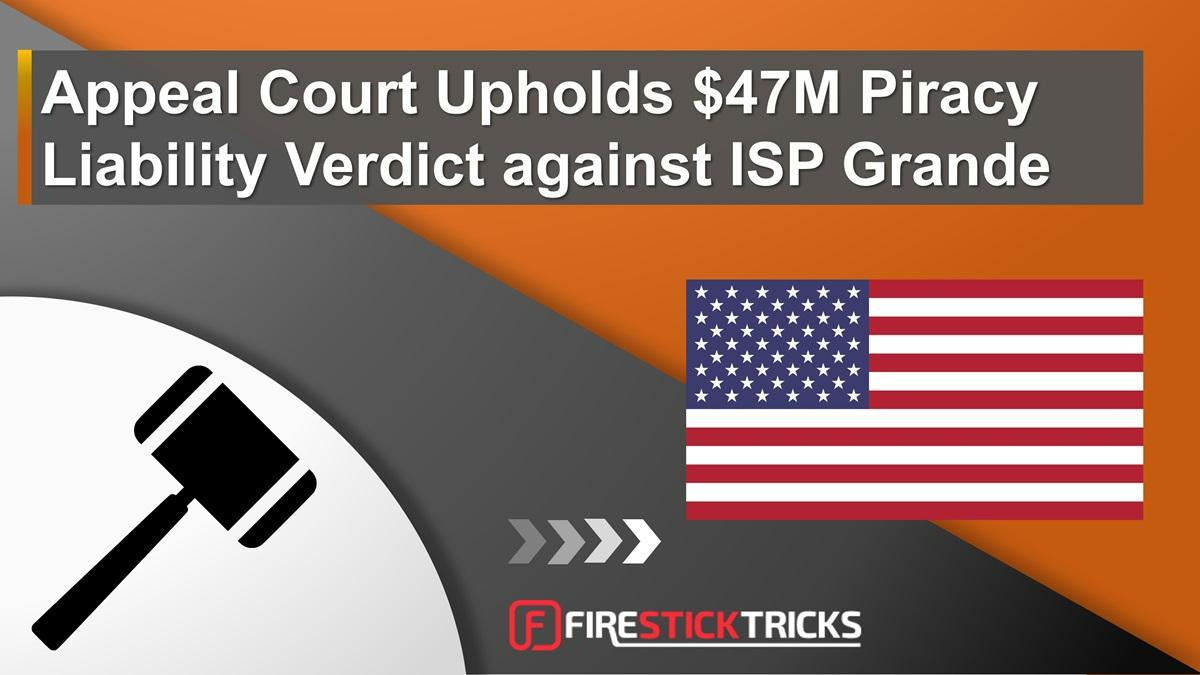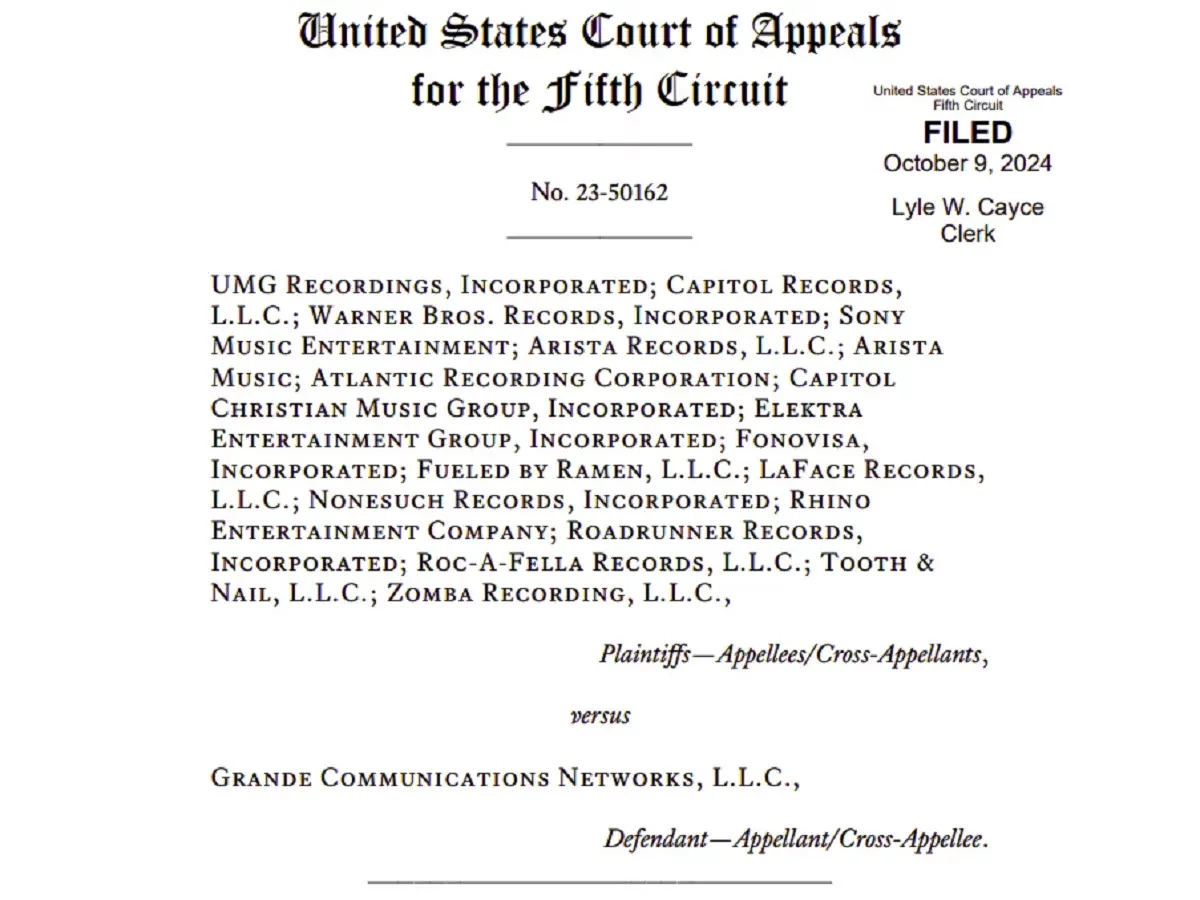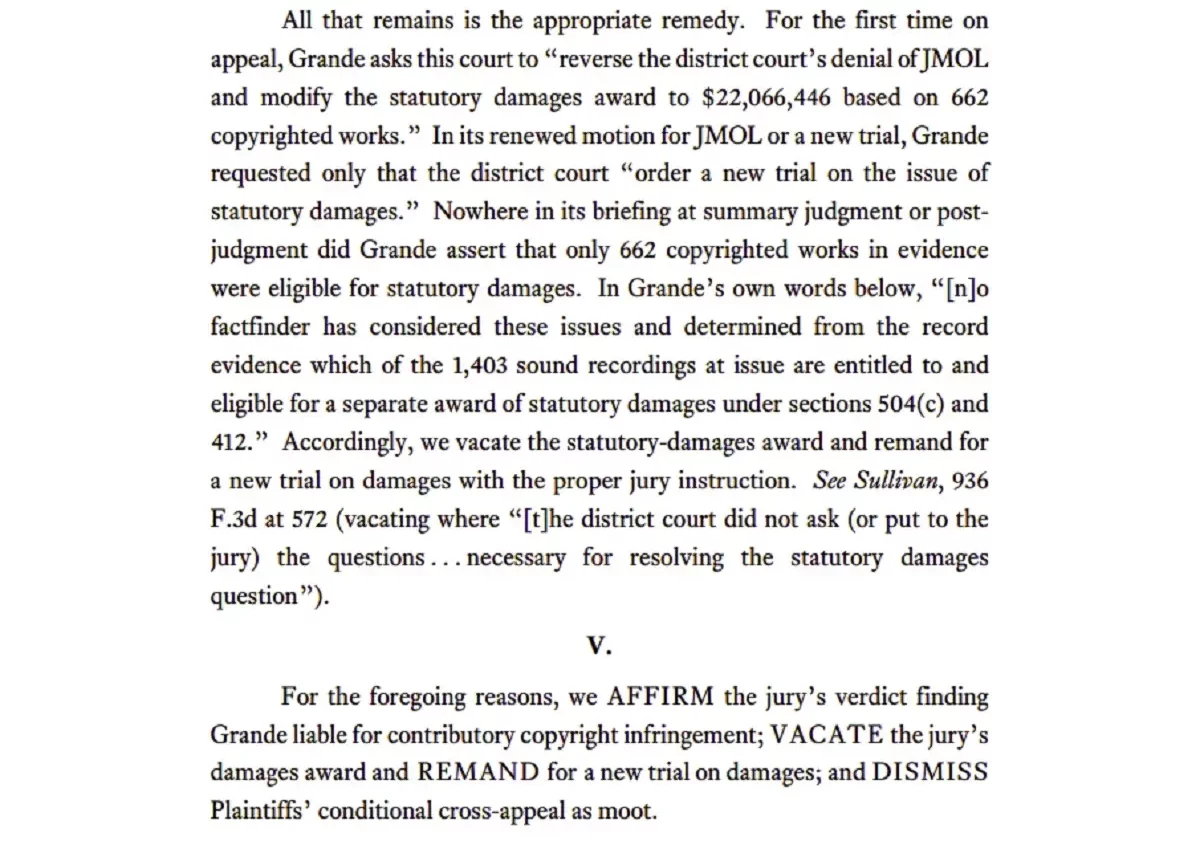The United States Court of Appeals for the Fifth Circuit has upheld a copyright infringement verdict against Grande, a Texas-based Internet Service Provider (ISP). The ISP had appealed a district court decision that had awarded RIAA, the plaintiff, $47 million in statutory damages. While the appellate court affirmed the verdict, the damages award was vacated, and the case is headed to a new trial.

In 2017, major record labels sued Grande Communications Network through the RIAA for failing to terminate the accounts of infringing subscribers.
The RIAA argued that the Texas-based ISP did nothing to stop subscribers involved in BitTorrent infringement worth over 1 million dollars.
Grande lost the lawsuit in 2022 when a federal court in Texas ruled that the ISP was liable for its subscribers’ copyright infringement. The court also awarded the prominent record labels $47 million in statutory damages for “willful copyright infringement of 1403 copyrighted works.”
RIAA was satisfied with the decision, saying:
The jury’s strong action sends an important message to Internet Service Providers
Attention IPTV Users!
Governments and ISPs across the world monitor their users’ online activities. If you use third-party IPTV services, you should always use a good IPTV VPN and hide your identity so your streaming experience doesn’t take a bad turn. Currently, your IP is visible to everyone.
I use ExpressVPN, the fastest and most secure VPN in the industry. It is very easy to install on any device, including Amazon Fire TV Stick, PC, Mac, and Smartphones. Also, it comes with a 30-day money-back guarantee. If you don’t like their service, you can always ask for a refund. ExpressVPN also has a special deal where you can get 4 months free and save 78% on the 2-year plan.
Read: How to Install and Use Best IPTV VPN
Grande Appeals the Verdict
Grande was not happy with the lower federal court’s decision. In September 2023, the ISP filed an appeal in the United States Court of Appeals for the Fifth Circuit. The company argued that ISPs shouldn’t be liable for pirating subscribers based on third-party allegations.
In the opening brief, Grande questioned why a service provider is held liable for its users’ actions.
The brief read:
This appeal presents important questions of first impression in the Circuit about whether, and in what circumstances, an internet service provider may be held secondarily liable for the conduct of users of its service.
Prominent telecommunications organizations rallied behind Grande, saying terminating internet access or subscribers is not viable because it can have an adverse impact beyond the alleged wrongdoers. USTelecom and Cellular Telecommunications Industry Association (CTIA) said terminating infringing customers is drastic and could affect entire households, coffee shops, libraries, offices, and more.
RIAA Counters the Appeal
RIAA countered the appeal through its defense lawyers, maintaining that the lower court made the right decision. They presented evidence demonstrating that the ISP “had a simple measure available to prevent further damages to copyrighted works.”
In this case, the ‘simple measure’ meant terminating the accounts of pirating subscribers as soon as they were discovered. The record labels said that while Grande was offered this measure, it never took it.
RIAA also said that the appellate court should uphold the verdict because the alternative would make handling the online piracy issue impossible. Furthermore, the rightsholders believe Grande failed to take any steps to increase its profits.
RIAA argued:
Grande decided in 2010 to maximize its revenues by continuing to collect subscription fees from subscribers it knew were repeat copyright infringers and providing them with the tools necessary to continue infringing.
The brief also revealed that RIAA sent over a million copyright infringement notices to Grande. Grande did nothing in response, not even terminating a single account from said infringers.
It is evident that ISPs can see what you do online. Even though Grande did not take any action, other ISPs might, especially after this verdict. Therefore, it is extremely important to hide your online activities with a reliable VPN. I trust, use, and recommend ExpressVPN.
Court of Appeal Affirms the Federal Court’s Verdict
After a three-week hearing and jury trial, ten jurors unanimously affirmed the lower court’s decision. The court of appeal upheld the guilty verdict and ruled that Grande was liable for willful contributory copyright infringement. According to the judges, the plaintiff’s defense met the required legal and factual elements to affirm the verdict.
The appellate court’s decision read:
The district court did not err in upholding the jury’s unanimous liability verdict because plaintiffs satisfied each element legally and factually.
The decision further states that the federal court’s ‘basic measures’ ruling did not lower the liability bar, as Grande claims.
The instruction made clear that Grande was liable if it intentionally continued to provide access to infringing sound recordings unless Grande was incapable of taking basic measures to prevent further damages to copyrighted works…Grande had available to it at least one basic measure: it could have terminated high-speed internet services to known, repeat infringers as it did when subscribers failed to pay the monthly fees.
Influence By Twitter’s Lawsuit among Other Supreme Court Opinions
Grande’s conviction to appeal the case was influenced by several Supreme Court opinions that overturned decisions by lower courts. These include the Twitter vs. Taamneh (2023), Sony vs. Universal City Studios (1984), and MGM Studios vs. Grokster (2005) lawsuits.
However, none of the decisions presented in the above lawsuits holds that knowingly providing a material contribution to infringement isn’t enough to prove liability. The court decision explains:
Grande contends that material contribution is not a valid basis for contributory copyright liability, based on its readings of three Supreme Court opinions… However, none of these decisions holds that knowingly providing material contribution to infringement is an inadequate basis for a finding of contributory copyright liability.
Material Contribution to Infringement
The Fifth Circuit Court of Appeal found the evidence presented by the plaintiff to be sufficient. The record labels proved they owned the copyrights to the music in question and showed how Grande’s subscribers shared the music illegally via P2P sharing.
The plaintiff also demonstrated that Grande knew about the infringing customers. The millions of piracy notices sent to Grande showed that the ISP provider knew about the repeat offenders yet took no action to stop it.
$14 Million Jury Award Vacated
Grande’s efforts at an appeal didn’t go unrewarded. Although it lost the appeal, as far as the verdict is concerned, the appellate court found an issue with the jury’s $14 million statutory damages to the rightsholders.
Evidence provided showed that many works in the suit are albums comprising individual songs. The lower court erred in awarding statutory damages to RIAA because an album is eligible for only one statutory damage award.
The appellate court said:
The statute unambiguously instructs that a compilation is eligible for only one statutory damage award, whether or not its constituent works are separately copyrightable. Thus the district court erred in holding that each song in a compilation was eligible for a statutory damage award.
With this, the Court of Appeal remanded for a new trial on damages.
This decision is a win for the RIAA and the record label it represents. It also serves as a warning to service providers that they can be held liable for their customers’ infringing actions. What do you think about this development? Let us know in the comments section.
Related:
- Streameast Domains Seized by Feds!
- Streameast Appeals Against Domain Seizures
- ACE Targets HiAnime & Several Other Piracy Sites
- Italian Courts Order Seizure of Assets Linked to IPTV Piracy Operation

Suberboost Your FireStick with My Free Guide
Stay Ahead: Weekly Insights on the Latest in Free Streaming!
No spam, ever. Unsubscribe anytime.




Leave a Reply